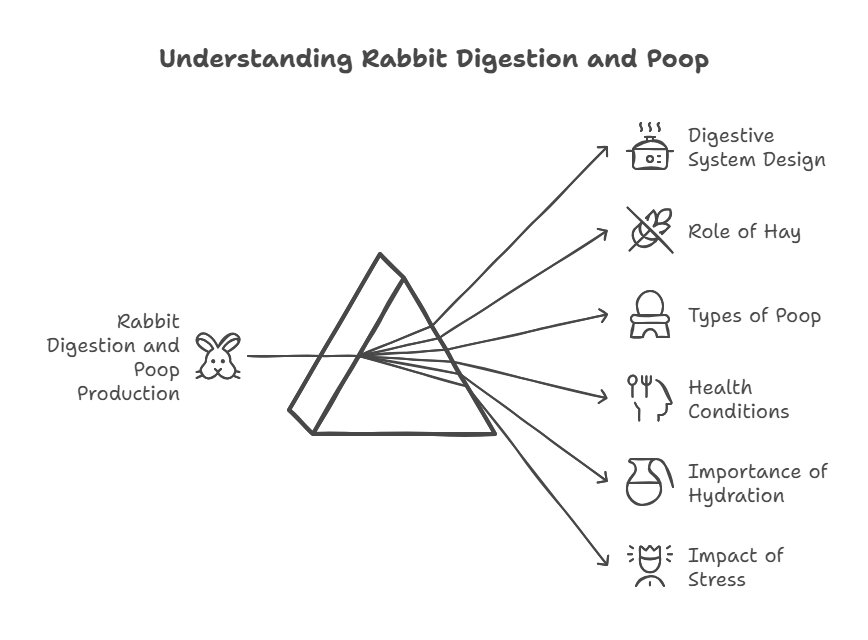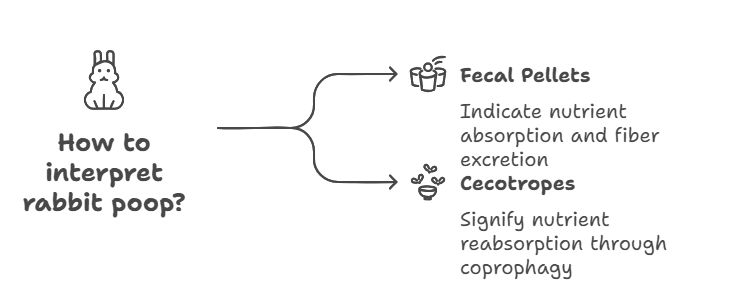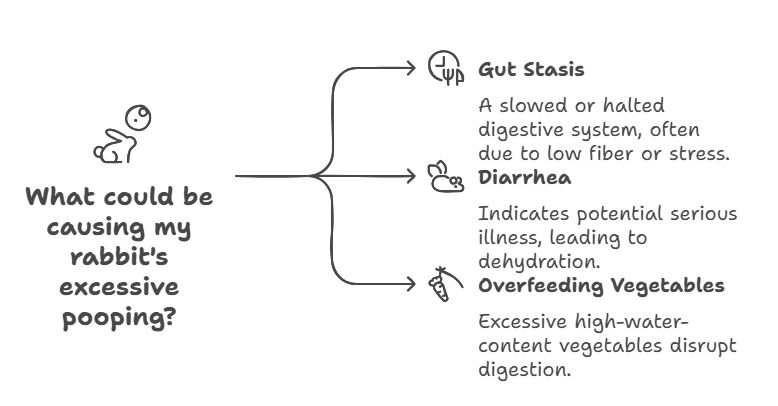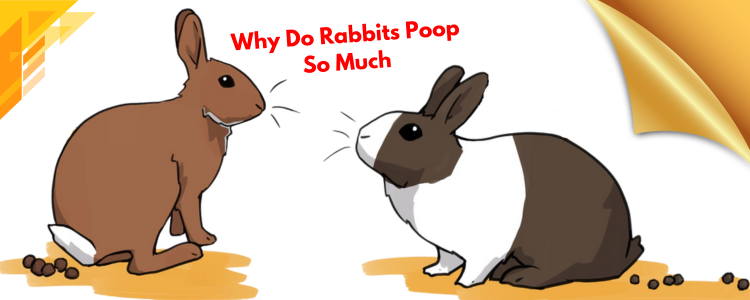Rabbits poop frequently due to their unique digestive system, which needs to expel a lot of waste to process their food. Rabbits are adorable little creatures, known for their floppy ears, twitching noses, and innocent eyes. But why do rabbits poop so much? Is this normal behaviour? Can it be harmful to their health?
Why Do Rabbits Poop So Much?
In this article, we’ll break down the reasons why rabbits poop so much, discuss what’s normal and what’s not, and help you understand how their digestive system works. Let’s hop right into it!

1. A Rabbit’s Digestive System Is Built for Constant Eating
Rabbits are herbivores. Their diet consists mostly of high-fiber foods, such as hay, vegetables, and some fruits. The fiber they consume is crucial for their digestion. Unlike humans, rabbits don’t eat three meals a day. Instead, they nibble constantly throughout the day.
This means their digestive system is designed for continuous activity. Their bodies work hard to break down all the fibrous material they consume. As a result, rabbits poop frequently. Their digestive system is constantly processing food, which leads to a lot of droppings.
2. The Role of Hay in Rabbit Digestion
Hay is an essential part of a rabbit’s diet. In fact, it should make up about 80% of their daily intake. Hay contains a lot of fiber, which is necessary for good digestion. Fiber helps to move food through the digestive tract, preventing problems like constipation.
Because hay is so fibrous and difficult to digest, rabbits need to produce a lot of poop to get rid of all the waste that comes from breaking it down. This constant process of digestion and elimination leads to frequent droppings.
3. Two Types of Poop: The Good and the Bad
Not all rabbit poop is the same. There are two types of poop that rabbits produce: fecal pellets and cecotropes.

Fecal Pellets
These are the dry, round droppings that you usually see scattered around your rabbit’s cage or play area. Fecal pellets are the result of your rabbit’s body absorbing the nutrients it needs from its food. The rest of the material, which includes undigested fiber, is excreted as fecal pellets.
Cecotropes
These are softer, nutrient-rich droppings that rabbits consume directly from their anus. They are high in vitamins and minerals, especially B vitamins. Rabbits instinctively eat cecotropes to reabsorb these nutrients that their body hasn’t fully processed the first time around. This process is called coprophagy.
4. High-Fiber Diet = More Poop
As mentioned earlier, rabbits thrive on a high-fiber diet. The fiber in their food helps to keep their digestive system moving. A rabbit’s intestines are constantly working to process all the fiber it consumes, which leads to frequent bowel movements. If your rabbit is eating a lot of fiber, you can expect them to produce a lot of poop.
A rabbit’s diet should primarily consist of hay, with smaller amounts of fresh vegetables and some fruit. Some foods, like leafy greens, are easier to digest and might result in slightly fewer droppings. However, hay is the key player in keeping your rabbit’s digestive system functioning properly.
5. Health Conditions That Could Cause Excessive Pooping
In some cases, excessive pooping can be a sign of health issues. If your rabbit’s droppings are larger or more frequent than usual, it could indicate a digestive problem. Here are a few conditions that could affect your rabbit’s pooping habits:

Gut Stasis
Gut stasis occurs when your rabbit’s digestive system slows down or stops entirely. This can happen if your rabbit isn’t eating enough fiber or if they’re stressed. If left untreated, gut stasis can be life-threatening.
Diarrhea
Rabbits don’t typically get diarrhea, but if they do, it can be a sign of a serious illness, like a bacterial infection or an imbalance in their gut flora. Diarrhea can lead to dehydration, so it’s important to seek veterinary care immediately.
Overfeeding Vegetables
If your rabbit is eating too many high-water-content vegetables, it can lead to an increase in the frequency of their droppings. While vegetables are an important part of a rabbit’s diet, overfeeding them can disrupt their digestive system.
6. The Importance of Hydration
Water plays a crucial role in your rabbit’s digestion. Rabbits that aren’t getting enough water may experience constipation, which can lead to fewer, harder poops. On the other hand, if your rabbit is drinking a lot of water, it might result in more frequent pooping, especially if they’re eating a lot of high-fiber foods.
Ensure that your rabbit has access to clean, fresh water at all times. If you notice any changes in your rabbit’s water intake or poop frequency, consult a vet for advice.
7. Stress Can Affect Poop Frequency
Rabbits are highly sensitive animals. Stress can cause a variety of issues, including changes in their eating habits and their bathroom habits. If your rabbit is stressed, they may poop more or less frequently than usual.
Common stressors include:
- Changes in their environment (moving to a new home)
- Loud noises or sudden movements
- Lack of social interaction (rabbits are social animals)
- Poor living conditions or overcrowding
If you notice your rabbit is pooping more due to stress, try to create a calm, peaceful environment for them. Make sure they have enough space, companionship, and entertainment to keep them happy.
8. Healthy Rabbit Poop: What to Look For
Not all poop is created equal. Here’s what to look for to ensure your rabbit’s digestive system is healthy:
- Fecal pellets should be round, dry, and firm. They should not be sticky or soft.
- Cecotropes should be soft, shiny, and usually consumed by your rabbit within a short time of being produced.
- The color should be a uniform brown or dark brown. If your rabbit’s poop is black, runny, or discolored, it could indicate a health problem.
9. How Often Do Rabbits Poop?
Rabbits typically produce between 100 and 300 poops per day, depending on their size and diet. Larger rabbits may produce more droppings than smaller ones. If your rabbit is pooping much more than this, or much less, it may indicate a health problem that needs attention.
FAQs
1. Is it normal for a rabbit to poop so much? Yes, it’s normal! Rabbits have a high-fiber diet, which keeps their digestive system active, leading to frequent pooping.
2. What should I do if my rabbit’s poop is too soft? Soft poop can indicate digestive problems. Try adjusting their diet to include more hay and less water-rich vegetables. If it persists, consult a vet.
3. Why does my rabbit eat its cecotropes? Cecotropes contain important nutrients like B vitamins. Rabbits eat them to reabsorb these nutrients that weren’t fully absorbed the first time.
4. Can stress cause a rabbit to poop more or less? Yes, stress can affect your rabbit’s digestion. It may cause changes in poop frequency or consistency.
5. How can I tell if my rabbit is dehydrated? Signs of dehydration include lethargy, dry mouth, and fewer, smaller poops. Ensure your rabbit has constant access to fresh water.
Final Thoughts:
Rabbits poop a lot — and that’s perfectly normal! Their digestive system is designed for constant activity, and their high-fiber diet ensures they are processing food efficiently. Whether you’re a first-time rabbit owner or a seasoned pro, understanding why rabbits poop so much can help you maintain their health and happiness. By providing the right diet, hydration, and environment, you can support your bunny’s digestive health and ensure they continue to thrive.

